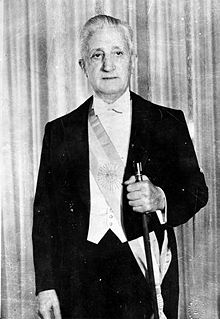Arturo Illia | |
|---|---|
 Illia with the presidential band (1963) | |
| 34th President of Argentina | |
| In office 12 October 1963 – 28 June 1966 | |
| Vice President | Carlos Humberto Perette |
| Preceded by | José María Guido |
| Succeeded by | Juan Carlos Onganía |
| National Deputy | |
| In office 20 April 1948 – 30 April 1952 | |
| Constituency | Córdoba |
| Lieutenant Governor of Córdoba | |
| In office 17 June 1940 – 19 June 1943 | |
| Governor | Santiago H. del Castillo |
| Preceded by | Alejandro Gallardo |
| Succeeded by | Asís Ramón |
| Provincial Senator of Córdoba | |
| In office 1 May 1936 – 24 April 1940 | |
| Preceded by | Fidel Torres |
| Succeeded by | Nicolás Pedernera |
| Constituency | Cruz del Eje |
| Personal details | |
| Born | Arturo Umberto Illia 4 August 1900 Pergamino, Buenos Aires, Argentina |
| Died | 18 January 1983 (aged 82) Córdoba, Argentina |
| Resting place | La Recoleta Cemetery, Buenos Aires |
| Nationality | |
| Political party | Radical Civic Union |
| Spouse | |
| Children | Emma Silvia Illia Martín Arturo Illia Leandro Hipólito Illia |
| Alma mater | University of Buenos Aires |
| Signature |  |
Arturo Umberto Illia (Spanish pronunciation: [aɾˈtuɾo wmˈbeɾto ˈilja]; 4 August 1900 – 18 January 1983) was an Argentine politician and physician, who was President of Argentina from 12 October 1963, to 28 June 1966. He was part of the Radical Civic Union, and the People's Radical Civic Union during his presidency.[1]
Illia reached the presidency of the Nation in elections controlled by the Armed Forces in which Peronism was outlawed and while the previous constitutional president Arturo Frondizi was detained. During his government, the national industry was promoted, 23% of the national budget was allocated to education (the highest figure in the history of the country), unemployment fell, the external debt decreased, a literacy plan was carried out and sanctioned the Minimum, Vital and Mobile Salary law and the Medications Laws.
He was noted for his honesty and trustworthiness, an example of this being the fact that Illia lived almost all his life in his humble home in Cruz del Eje, where he devoted himself to medicine, and that he never used his influence to his advantage, to the point such as having to sell his car while in office and refusing to use public funds to finance his medical treatments. After his government, he maintained his active political militancy, rejected the retirement perks he had earned as president, and returned home to continue dedicating himself to medicine.